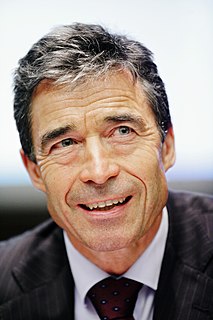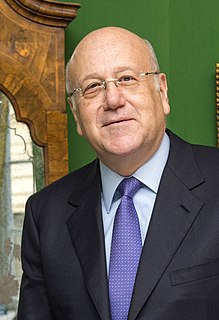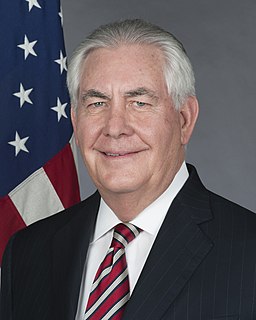A Quote by Anders Fogh Rasmussen
Some countries such as Iran and Syria are using the commotion to distract attention from their own problems with the international community. The Palestinians, who have been deeply divided since their election, have found a common enemy in Denmark that unites them. Extremists and fundamentalists are exploiting the conflict to promote their radical agenda and win new members.
Quote Topics
Agenda
Attention
Been
Common
Common Enemy
Community
Conflict
Countries
Deeply
Denmark
Distract
Divided
Election
Enemy
Exploiting
Extremists
Found
International
International Community
Iran
Members
National Community
New
New Me
Own
Palestinians
Problems
Promote
Radical
Since
Some
Syria
Them
Unites
Using
Win
Related Quotes
Syria's neighboring countries cannot and should not carry the cost of caring for refugees on their own. The international community must share the burden with them by providing economic aid, investing in development in those countries, and opening their own borders to desperate Syrian families looking for protection.
We have a common enemy. We have this in common: We have a common oppressor, a common exploiter, and a common discriminator. But once we all realize that we have this common enemy, then we unite on the basis of what we have in common. And what we have foremost in common is that enemy - the white man. He's an enemy to all of us. I know some of you all think that some of them aren't enemies. Time will tell.
Kissinger-type foreign policy is clearly, in my view, the proper tilt for us in the future, and he [Donald Trump] gets it. And some of our members, I guess, have been so deeply committed to the [George W.] Bush agenda, the neo-conservative agenda, that it's harder for them to acknowledge that. But I acknowledge it.
After Iraq, there's been Libya, there's Syria, and the rhetoric of, you know, democracy versus radical Islam. When you look at the countries that were attacked, none of them were Wahhabi Islamic fundamentalist countries. Those ones are supported, financed by the U.S., so there is a real collusion between radical Islam and capitalism. What is going on is really a different kind of battle.
I deeply regret to say that terrorism has become globalized: ' From New York to Mosul, from Damascus to Baghdad, from the Easternmost to the Westernmost parts of the world, from Al-Qaeda to Daesh'. The extremists of the world have found each other and have put out the call: 'extremists of the world unite'. But are we united against the extremists?
I think that all countries of the region should join their efforts in the fight against a common threat - terrorism in general and ISIS in particular. It concerns Iran as well, it concerns Saudi Arabia (although the two countries do not get along very well, ISIS threatens both of them), it concerns Jordan, it concerns Turkey (in spite of certain problems regarding the Kurdish issue), and, in my opinion, everybody is interested in resolving the situation. Our task is to join these efforts to fight against a common enemy.
I’m trying to learn more about international law to understand why we don’t have better solutions for conflict - for dictators or aggressors that are hurting or raping children or using them as child soldiers. Why can’t we have an international community handle these things in a swift, efficient manner?
We reject the killing of innocents to achieve a radical and violent agenda. The terrorists and their state sponsors, Iran and Syria, have a much darker vision. They're working to thwart the efforts that of the Lebanese people to break free from foreign domination and build their own democratic future. The terrorists and their sponsors are not going to succeed. The Lebanese people have made it clear they want to live in freedom. And now it's up to their friends and allies to help them do so.










































